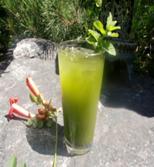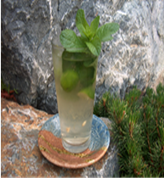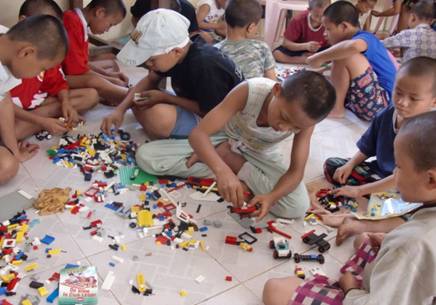Thank you, Denver!
 
Top of the Town — Patio Dining
EDITOR'S CHOICE 2011
Domo Japanese Country Foods Restaurant
Imagine yourself in an enchanted Japanese garden where wooden footbridges arc over trickling koi ponds, sculptural trees complement stone pathways, and standing lanterns cast a soft glow over your rustic wooden table. Now imagine this serenity plunked in an out-of-the-way alcove of central Denver, and you'll find yourself at Domo—or rather, just outside the back door of this Japanese eatery on a patio enclosed by the restaurant and its cultural museum. Take your time with the extensive menu—the hefty entrées offer a taste of traditional Japanese countryside—and savor the ambience as much as you do your steaming donburi (rice bowl with sashimi and veggies) or simmering seafood nabemono (stew pot). Bring friends: The round tables are easily big enough for six. 1365 Osage St., 303-595-3666, www.domorestaurant.com
Summer Sake Fest
Enjoy Domo‛s Home Select Sake Served Chilled Summer Style!
Matcha Tea Cocktail
Real Tea Taste, Unsweetened! NEW! Matcha Tea Cocktail is made with the finest ground whole-leaf Japanese
green tea (Matcha) mixed with Shochu; a traditional Japanese liquor made from buckwheat. With fresh mint! Matcha is rich in Catechin and vitamins E and C. $8.00
 Kosui Kosui
Domo‛s Original Tall Sake Cocktail Sake, plum wine, seltzer, fresh lime and mint. $8.00
Chef's Corner
The Story of Wasabi
When I first came to the United States, I believed that "chicken fried steak" was made from chicken and that "buffalo wings" came from buffalo. I believed this for a very long time before I figured out that these were just names for these foods and did not necessarily reflect the ingredients! I know that not only me, but many foreigners in the United States were also puzzled by "rocky mountain oysters" and "bulldog" sauce! Luckily I discovered that there are no bull dogs in "bulldog" sauce; it is just the name of a brand of steak sauce!
The same is true for Americans familiar with Japanese sushi served in the United States. I have news for you about "wasabi" that you might find surprising!
What everyone calls wasabi, the spicy condiment served with sushi in the United States is actually not real wasabi. What is normally found in sushi bars in the United States is horse radish powder mixed with additives and green food coloring. Before it is served, this horse radish powder is mixed with hot water and served as wasabi.
Real wasabi is made from the Japanese plant Wasabiajaponica, which grows on the banks of fresh mountain streams. When I worked for the Lake Towada Folk Art Museum, I used to go deep into the forests with the locals to gather these prized plants growing near the cold water stream beds. When found, these plants were carefully uprooted and brought back down to the village. The thumb size roots we sold to a local hotel for a hefty sum, and the leaves and stalks were boiled by the locals and eaten with soy sauce. The greens are very spicy but have a wonderful flavor.
Real wasabi root costs at least 10 times more than the imitation and would be quite a costly item for regular sushi bars that use a lot of wasabi paste. Real wasabi is ground on a grinder made of shark skin and served fresh in very small amounts.
Some restaurants do not use powdered horse radish but make their own wasabi from ground horse radish, additives and food coloring to turn it a moss green color. This is also not real wasabi.
I hope I have not disappointed those who have thought the wasabi paste they had enjoyed at the sushi bar was real wasabi, but to show your knowledge as a sushi connoisseur, this is a handy bit of information to have for your next visit to the sushi bar!
Written by
Gaku Homma
Domo Owner and Head Chef
Dine at Domo and Feed the World
"Lego for Learning Campaign"
www.aikidoforbeginners.org/videos-ahan.html
Domo restaurant plays a role in AHAN, the international humanitarian branch of Nippon Kan. One of the ways that Domo supports AHAN is through our campaign "Dine at Domo and Feed the World".
This video was shot at the Yadanapon temple orphanage in February of 2011 in Yangon, Myanmar. AHAN International has been supporting the Yadanapon temple by supplying rice, medical and educational supplies for the last four years. On this trip, we discovered that Lego make a wonderful toy as well as educational tool for the children under our watch. In the past AHAN has supplied crayons, pens, paints and paper for children in need all over Asia, Central and South America and the Middle East. Crayons and paper are effective in developing creativity and motor skills however these supplies are all consumable and eventually outlive their usefulness. The Lego however can be used over and over again for years to come.
This year we began the "AHAN Lego for Learning Campaign", encouraging students to check for old Lego sets no longer needed at home and collected over 2000 pieces to take to the orphanage in Myanmar. At first the children were puzzled; they had never seen Lego before. It took only moments however before all of the boys were focusing with great concentration on building wonderful Lego creations with imagination and skill.
The project was such a success we have decided to extend the program to children in Bangladesh and the Philippines as well. We are hoping that our customers at Domo will be able to help with this effort by bringing to Domo any old Lego sets you might not have use for any more.
Even if you do not have any Lego sets at home to bring in, PLEASE PASS THIS MESSAGE ALONG TO FAMILY AND FRIENDS WHO MIGHT LIKE TO JOIN THE EFFORT! We would appreciate your help, but this time we are looking only for Lego. Other toys can be difficult to transport or might need batteries which are not readily available. For these reasons we are only accepting Lego and hope you will join us in our "LEGO FOR LEARNING" Campaign.
Culture for the kids!
A wonderful way to introduce your kids to traditional Japanese culture and cuisine with Nippon Kan's Chidren's Cultural School Field Trip program. Ask your teachers about signing up for a fieldtrip! Click here for more information.
top
Nippon Kan Beginning Aikido Classes
Enjoy the traditional Japanese foods at Domo and right next door, experience the traditional Japanese Martial Art of Aikido!
Beginning Class Schedule for 2011 at www.aikidoforbeginners.org
No time tonight to dine out at Domo?
Then dine IN with Domo' s Express take-out menu for lunch and dinner!
Domo Restaurant now features our Domo Express Take-Out Menu for lunch and dinner. All entrees include three of Domo's famous country side dishes, miso soup and brown or white rice with barley. Order by phone or come in to order a delicious Domo meal to go!
Domo Express Take Out is available during regular business hours Monday through Saturday.
top
Check out our chopsticks!
Domo has a new message for our customers on our website, in our restaurant and even on our chopsticks wrappers. Check it out and 'Dine at Domo and Feed the World'
Domo Restaurant is housed in Nippon Kan Culture Center, a 501 3 Federal non-profit organization first established in 1978 and plays an important role in the overall cultural and humanitarian purposes of the center.
Currently Nippon Kan's local and international cultural and humanitarian efforts are conducted through AHAN (The Aikido Humanitarian Active Network). Nippon Kan AHAN supports projects world-wide and Domo is a primary sponsor for all AHAN activities. Two of our many projects include supplying one ton of rice per month for two orphanages in Bangladesh and locally,'eighteen years of consecutive service and 50,000 meals served to the homeless at the Denver Rescue Mission.
More information on all of AHAN's many project in other countries like Nepal, the Philippines, East Timor, Mongolia, Guatemala, Mexico, Turkey, and more can be found on the Nippon Kan website at www.nippon-kan.org. Proceeds from every meal served at Domo are used to help fund these many projects world-wide. I hope that this year too, our customers and friends at Domo will continue to support our efforts with your patronage.
Domo's customer service questionnaire is online!
Customer comments are now welcome ON LINE on the Domo website. Enter to win and let us know how your experience was at Domo.
Awards
Mayors Design Award; "Home is Where the Art is" November 10, 2010
Westword's Best Traditional Japanese Restaurant in Denver 2010
(15 consecutive years 1997-2011)
Domo Restaurant has been named in Zagat's National Restaurant Review's America's Top Restaurants 2009!
*Etown' E-Chievement Award
Gaku Homma Aikido Humanitarian Active Network February 2009
Celebrating those who are making a positive difference in their communities and beyond.
Other recent awards
Zagat's # 1 Japanese Restaurant in décor in the USA
Zagat's Top Japanese Restaurants in Colorado 2008
top
Domo Restaurant is part of Nippon Kan Culture Center and a partner with AHAN (the Aikido Humanitarian Active Network).
For more information on Nippon Kan classes and activities in Denver, and AHAN humanitarian projects world-wide, www.nippon-kan.org and www.aikidoforbeginners.org.
|


